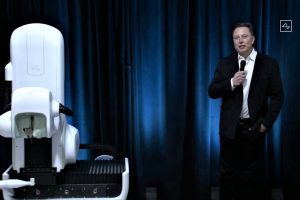- 🧠 Neuralink’s First Human Implant: “Telepathy” – Elon Musk announces the successful implantation of Neuralink’s first human device called “Telepathy.” “Telepathy” allows users to control digital devices through brain waves.
- 🚀 Successful Operation and Promising Results: Musk reports that the first patient with the Neuralink implant is recovering well, and initial results are promising.
- 📱 Control Devices by Thinking: “Telepathy” enables users to control phones, computers, and almost any device through thoughts. Initial users are expected to be individuals who have lost the use of their limbs.
- 🌐 Vision for Enhanced Communication: Musk envisions the potential for improved communication, referencing individuals like Stephen Hawking communicating faster than a speed typist or auctioneer.
- 🎥 Teaser Reveals Capabilities: A Neuralink video teaser showcases the capabilities of “Telepathy,” allowing users to connect with loved ones, browse the internet, and play games using only their thoughts.
- 🤝 Steps Towards Mainstream Adoption: Neuralink seeks volunteers for its PRIME Study, focusing on individuals with quadriplegia or ALS. Musk’s announcement suggests Neuralink is moving towards making brain implants a mainstream product.
- ⏱️ Long-Term Commitment for Clinical Trials: The PRIME Study by Neuralink spans about six years, with an 18-month primary study followed by a long-term follow-up phase lasting over five years. Volunteers must commit to one-hour Brain-Computer Interface (BCI) research sessions at least twice a week.
- 🔄 Evolution of Neuralink’s Clinical Trials: Neuralink’s PRIME Study represents a significant step in the evolution of clinical trials for brain implants, emphasizing a prolonged commitment and potential for mainstream adoption.
- 📄 Access to PRIME Study Brochure: The brochure for Neuralink’s PRIME Study provides additional insights into the study’s structure and objectives.
In a groundbreaking development, Elon Musk has recently taken to X (formerly Twitter) to announce the successful implantation of Neuralink’s first human device, aptly named “Telepathy.” This revolutionary brain implant holds the promise of enabling users to control digital devices through the power of their thoughts.
Unlocking the Potential: A Successful Operation and Early Results
Musk’s announcement comes with positive news about the first patient who received the Neuralink implant. The individual is reported to be recovering well, and early results from the operation are showing promise, marking a significant milestone in the field of neurotechnology.
The Power of Thought: Controlling Devices with “Telepathy”
“Telepathy” opens up a realm where users can seamlessly control their phones, computers, and a myriad of other devices through the sheer power of their thoughts. This marks a crucial advancement, especially for individuals who have lost the use of their limbs, positioning “Telepathy” as a potential game-changer in accessibility technology.
A Vision for Enhanced Communication
Elon Musk, in his announcement, paints a compelling vision for the future. He envisions a scenario where “Telepathy” could lead to vastly improved communication, citing the example of luminaries like Stephen Hawking communicating at speeds surpassing professional typists or auctioneers. The goal is to empower individuals with a level of communication previously deemed unimaginable.
Teasing Capabilities: A Glimpse into the Future
A tantalizing glimpse into the capabilities of “Telepathy” was provided by Neuralink through a video teaser. This brief clip, part of the company’s Precise Robotically Implanted Brain-Computer Interface (PRIME) Study, showcases users connecting with loved ones, browsing the internet, and playing games—all achieved solely through their thoughts.
Towards Mainstream Integration: Neuralink’s Steps
Neuralink’s call for volunteers for its PRIME Study is a significant move toward the mainstream integration of brain implants. The study particularly targets individuals suffering from quadriplegia or amyotrophic lateral sclerosis (ALS). Musk’s announcement strongly indicates Neuralink’s commitment to making brain implants accessible to a broader audience.
Long-Term Commitment for Revolutionary Trials
The PRIME Study, spanning approximately six years, emphasizes the considerable commitment required from participants. With an 18-month primary study followed by a long-term follow-up phase exceeding five years, the study aims to comprehensively understand the long-term effects and benefits of “Telepathy.” Volunteers are expected to dedicate at least two hours per week to Brain-Computer Interface (BCI) research sessions.
Evolution of Neuralink’s Clinical Trials
Neuralink’s PRIME Study represents a pivotal evolution in the landscape of clinical trials for brain implants. The extended duration and the focus on mainstream accessibility underscore Neuralink’s dedication to ensuring the safety, efficacy, and eventual widespread adoption of this groundbreaking technology.
Delving Deeper: Access to PRIME Study Brochure
For those eager to delve deeper into the intricacies of the PRIME Study, Neuralink provides a comprehensive brochure. This document offers additional insights into the study’s structure, objectives, and the scientific rigor applied in advancing the frontiers of neurotechnology.
In conclusion, “Telepathy” and the associated PRIME Study mark a watershed moment in the fusion of technology with the human mind. As we witness the dawn of a new era in neuroscientific exploration, the potential societal implications are vast, promising a future where the power of thought transcends boundaries.





